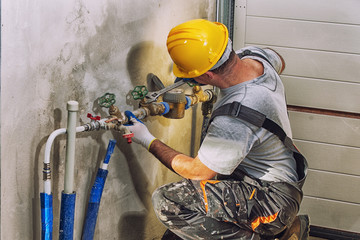Plumbing is an exciting career option! Plumbing is more than just a bathroom or kitchen sink. The term originates in the ancient Romans, where the lead pipe was used extensively. The Latin word for lead, plumbom, refers to plumbing, but it isn’t the same as plumb’s carpentry term. Plumbing technicians perform various tasks that connect water, waste, and other components. They can also repair and replace entire systems.

The plumbing scope is extremely broad, and some of the most important jobs involve constructing pipes and fixtures within a building. In addition to distributing water and waste, plumbers are responsible for maintaining and installing appliances, sanitary systems, and storm drainage systems. In addition, plumbers are responsible for installing faucets and other fixtures. The plumbers understand building codes to ensure proper functioning. Before beginning a new project, it’s good to contact the local licensing authority.
Residential plumbing is straightforward, while commercial plumbing is much more complicated. Plumbing drain lines are snaked from each unit to the main sewer line. While residential plumbing is easy to diagnose, commercial plumbing systems have multiple floors and are more likely to have more leaks and larger problems. Plumbing can be extremely complex in commercial buildings and missed leaks can lead to serious dripping and large bills. If it’s not fixed before it becomes too late, the problem could lead to a ruined reputation.
Water pipe systems are responsible for bringing fresh water into a home and removing wastewater. This water travels through a meter that registers how much water is used. The main water shutoff valve is located near the meter. The shutoff valve must be closed if there’s a plumbing emergency. It would be best if you also shut off the water supply before attempting a plumbing repair. If a plumbing emergency is a surprise, the water supply must be shut off.
The main problems associated with indoor plumbing include attitudinal and technical obstacles. Water supply and wastewater removal required just as much care. In addition, the miasma theory of illness held that bad air caused illnesses. Many people believed that bad air in a house was the cause of illness. This premise led to a distrust of early indoor plumbing, as early indoor plumbing often tended to leak and generate sewer gas. Additionally, many people still believed that eliminating was best performed outdoors.
The proper sizing of a sanitary drain depends on the number of fixtures served. A house drain is normally 4 inches in diameter. Various materials, such as cast iron, vitrified clay, plastic, and lead, are used to build house drains. In DWV systems, PVC and ABS pipes are the top choices. Besides installing a sanitary drain, ensuring proper scouring action will prevent the accumulation of solid waste.
The main material used in residential plumbing systems is PVC. This type of pipe is popular because of its affordability and wide range of fittings. While PEX pipes aren’t as durable as rigid pipes, they’re also flexible and easy to install. And unlike rigid pipes, PEX doesn’t need any glue or cement to connect them. PEX pipes can also be compatible with metal pipes. A good plumber will recommend a plumbing system based on its compatibility with your home.
Copper pipes are another popular option for residential and commercial plumbing systems. While they are highly resistant to rusting and leaking, they are susceptible to certain soil conditions. Checking local building codes is essential when installing underground plumbing systems. If you plan to install copper pipes, it’s best to consider what type of soil conditions will affect their performance. If you have a well-constructed house, copper pipes are the best choice. These pipes are also fire-resistant.
A plumber’s job is as important as oxygen is to the human body. Proper plumbing will ensure a clean water supply and prevent mold and mildew growth. A plumber also installs, maintains, and repairs water boilers and furnaces. Even a simple clogged toilet can impede daily tasks. That’s why it’s important to have a plumbing system checked regularly by qualified professionals. You’ll be glad you did.
Homeowners should learn all about plumbing before installing it in their homes. Plumbing is an essential system in a home, providing safe water for drinking and washing. It is also essential to maintain sanitation and safe waste removal. Learning as much about plumbing basics can help you make the right choices for your home and avoid making a mistake. And remember, the sooner you learn about plumbing, the easier it is to install new fixtures and pipes. So, don’t wait! Get educated on plumbing!
